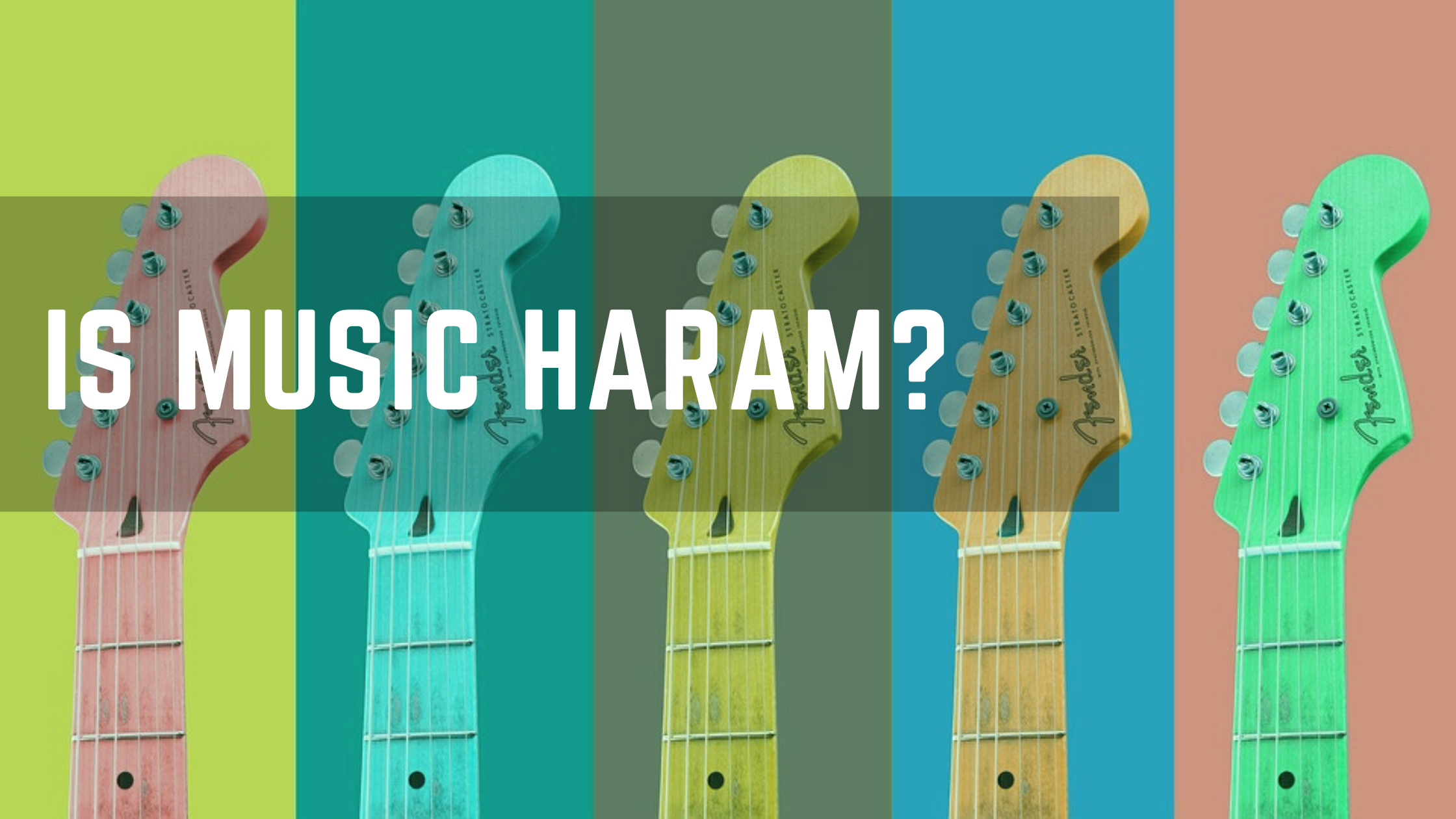Yes, music is considered haram. music is considered a sinful act, which can lead to the sickening and weakening of one’s heart. It also suggests that the majority of scholars from the Salaf, an early Islamic period, agree that using musical instruments, singing, and listening to music is Haram.
Music is an integral part of many cultures and faiths around the world. But in some cases, it has been seen to go against religious beliefs. Is music haram or forbidden according to Islamic teachings? This blog will explore this question in detail, discussing various opinions from both Islamic scholars and laymen on whether or not Islam forbids musical instruments, singing and more.
We will look into various interpretations of the Qur’an and Hadith to determine whether or not music should be considered haram in Islam. Finally, we will consider how different Islamic traditions approach music, and provide our own opinion on the matter. So join us as we explore this important question – is music haram?
What is Haram?
There are many things that can be considered haram, or forbidden, in Islam. Some of these behaviours are considered haram because they are explicitly mentioned in the Quran or Sunnah. Others are considered haram because they are harmful to oneself or others, or because they violate the principles of Islam.
Many lifestyle choices can be halal or haram. For example, getting tattoos is haram according to most scholars while smoking is haram or halal depending on where you are in the world. What about music though? Read till the end to find out!
Are Musical Instruments Haram As Per The Hadith?
Many Muslims have wondered if playing musical instruments is haram (forbidden) according to the hadith of Prophet Muhammad (PBUH). This is a difficult question to answer since there are conflicting opinions among scholars regarding this matter. Some believe that playing musical instruments is completely prohibited, while others argue that it can be done in moderation as long as it is not used for entertainment and other forbidden activities.
There are several hadiths that suggest the Prophet Muhammad (PBUH) prohibited the use of musical instruments, while there are others that do not necessarily forbid music. The most agreed upon hadith states that “Music in this world is evil except for what causes one to remember Allah”. This hadith clearly shows that playing musical instruments is not necessarily haram.
In addition, some other hadiths mention the use of drums and tambourines to praise Allah in spiritual gatherings, which indicates that there is room for moderate enjoyment of music. It is interesting to note that most scholars agree that singing religious songs or poems is acceptable even though they may be accompanied by musical instruments.
Overall, while many believe that playing musical instruments is haram according to some hadiths, it is important to remember that there are also hadiths that allow for moderate use of music as long as it does not distract one from the remembrance of Allah. Therefore, we should carefully consider the different opinions before making a final decision. Ultimately, it is up to each individual Muslim to decide what activities are permissible for them as long as they stay within the boundaries of Islamic teachings.
What Does Quran Say About Music?
The Quran is the holy book of Islam and it includes many references to music. For Muslims, the Quran is believed to be the direct word of Allah (God) as revealed to Prophet Muhammad. Music has been an important part of Islamic culture for centuries, and within Islamic law, there are certain guidelines that must be followed when it comes to music.
The Quran distinguishes between permissible and impermissible forms of music, as well as different types of instruments that may be used. The general consensus among Islamic scholars is that music in its purest form is permissible, so long as it does not contain any elements which are considered “haram”, or forbidden by Islamic law. Instruments such as the flute, lute, and drum are generally considered to be permissible for Muslims to play.
The Quran also contains verses which discuss other forms of music such as chanting and singing, however, these are often seen in a more spiritual context rather than being used purely for entertainment. In general, music is seen as a means to connect with God and as a way to enjoy the beauty of His creation.
The Quran also speaks about spiritual and religious music, encouraging believers to remember God through songs and hymns. Many religious gatherings and celebrations include singing as part of their worship service in order to express devotion toward Allah. Therefore, it is clear that although Islam does not encourage frivolous music, it does accept music as part of its spiritual practice.
Ultimately, the Quran offers a nuanced and complex view of music that is open to interpretation. Music can be used as a form of worship or entertainment depending on the circumstances, so long as it is in keeping with Islamic law. Therefore, Muslims must ensure that they do not engage in activities which are considered haram, and instead use music as a means to connect with God.
Is Music Haram?
There is no easy answer when it comes to the question of whether or not music is haram. The Islamic ruling on the matter is not black and white, and there are a number of factors that need to be considered when deciding whether or not listening to or creating music is allowed.
One of the key issues that need to be considered is the purpose of music. Some scholars argue that music is permissible if it is used for religious purposes, such as in prayer or during a sermon. Others argue that music can be used for other purposes, as long as it is not used to incite debauchery or wrongdoing.
However, there are also scholars who argue that music is always haram, regardless of its purpose. They argue that music is a distraction from the worship of Allah and can lead to sinful behaviour.
Ultimately, the decision on whether or not music is haram is up to each individual Muslim. You should consult with a scholar or other religious authority to get their opinion on the matter. If you are still unsure, it is best to avoid listening to or creating music. (Source)
What Kind Of Music Is Haram In Islam?
According to the teachings of Islam, some types of music are considered haram – or forbidden – and should be avoided. Generally speaking, music that includes lyrics or instruments that promote immoral values such as violence, promiscuity, alcohol/drug use, materialism, and other beliefs contrary to Islamic principles is deemed haram. Additionally, songs that encourage listeners to become distracted from their prayers, devotions or duties as Muslims may also be considered haram.
Instrumental music is generally permissible in Islam, so long as the instruments used do not promote immoral values and the music does not distract listeners from their Islamic duties. Instrumental songs are most often heard at weddings, parties, and other gatherings of celebration.
Islamic scholars agree that music should bring joy, peace, and relaxation to those who listen; however, some types of music are considered haram because they create a feeling of chaos or unrest. Songs with heavy drumbeats and loud noises may be seen as disruptive and distracting from the religion’s values.
Finally, some types of music that contain lyrics with no clear meaning may be considered haram because they can be seen as a form of manipulation. Songs that contain hidden messages or meanings have the potential to lead people away from their faith and towards other beliefs, making them haram in Islam.
Ultimately, it’s important for Muslims to be mindful of the types of music they listen to, not just in terms of what’s haram or permissible but also to ensure it isn’t distracting them from their Islamic duties and values. Music can bring joy, peace and relaxation into our lives, so long as it is kept in harmony with the teachings of Islam.
Is Classical Music Haram In Islam?
The question of whether classical music is haram in Islam has been debated for centuries. Islamic scholars have different views on the matter, but generally agree that music should be used for spiritual and educational purposes only and not for entertainment or frivolity. Classical music is considered more permissible than popular forms of musical expression such as rap or pop, due to its lack of explicit lyrics and tendency to evoke more subtle emotions.
In terms of classical music, some scholars have argued that as long as it is not used for entertainment purposes or frivolity, it is allowed in Islam. Other interpretations take into account the context in which a piece of music is heard. For example, if classical music was being used for a wedding or celebration, then it would be more permissible than if it were being heard in a nightclub.
Generally speaking, Islamic scholars agree that the use of classical music should be restricted to contexts which are conducive to spiritual contemplation and learning. This means that playing classical music in places where people are likely to become distracted by its sensual and emotive qualities is discouraged.
Ultimately, it is up to each individual Muslim to decide what sort of music they are comfortable with listening to. It is recommended that Muslims avoid any music which could lead them astray from the teachings of Islam or distract them away from worshipping Allah. If a person chooses to listen to classical music, they should ensure that it is not used for any purpose other than to aid spiritual contemplation and learning.
The Quran itself does not directly address the issue of classical music, but it does state that all forms of artistic expression should be used with moderation and respect. Muslims should therefore strive to use art in a way which is consistent with Islamic values and does not lead to distraction from the worship of Allah. As always, it is best for Muslims to use their own judgement and common sense when deciding whether classical music is haram or not in Islam.
FAQs
Does the Quran say music is haram?
Are you allowed to sing in Islam?
Is it haram to swear bad words?
Does music break your fast?
Conclusion
There are certain interpretations of Islam which view music as haram. However, there is no single interpretation that dictates if music is permissible or not. Ultimately, it is up to the individual Muslim to determine whether they believe music to be permissible in their religious practice and beliefs. Understanding the cultural context in which a certain type of music is used and listening to the lyrics of songs are key in helping an individual determine their stance on the matter. Ultimately, it is important for Muslims to use their own judgement when deciding what type of music they feel comfortable engaging with.
No matter one’s personal interpretations, it is undeniable that music has been a source of joy throughout centuries, and it is important for Muslims to understand their own beliefs about music in order to make their own informed decision.
Also explore Is Drawing Haram, Is Watching Anime Haram, Is Boxing Haram, Is Sufism Haram, Is Dancing Haram and many more at Halal Haram World.






